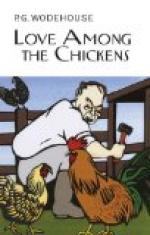“Beale,” said Ukridge, “you—er—there seems to have been a mistake.”
“Yes, sir.”
“You are not so much to blame as I thought.”
“No, sir.”
There was a silence.
“Anyhow,” said Ukridge in inspired tones, “I’ll go and slay that infernal dog. I’ll teach him to tear my door to pieces. Where’s your gun, Beale?”
But better counsels prevailed, and the proceedings closed with a cold but pleasant little dinner, at which the spared mongrel came out unexpectedly strong with ingenious and diverting tricks.
CHAPTER V
BUCKLING TO
Sunshine, streaming into my bedroom through the open window, woke me next day as distant clocks were striking eight. It was a lovely morning, cool and fresh. The grass of the lawn, wet with dew, sparkled in the sun. A thrush, who knew all about early birds and their perquisites, was filling in the time before the arrival of the worm with a song or two, as he sat in the bushes. In the ivy a colony of sparrows were opening the day with brisk scuffling. On the gravel in front of the house lay the mongrel, Bob, blinking lazily.
The gleam of the sea through the trees turned my thoughts to bathing. I dressed quickly and went out. Bob rose to meet me, waving an absurdly long tail. The hatchet was definitely buried now. That little matter of the jug of water was forgotten.
A walk of five minutes down the hill brought me, accompanied by Bob, to the sleepy little town. I passed through the narrow street, and turned on to the beach, walking in the direction of the combination of pier and break-water which loomed up through the faint mist.
The tide was high, and, leaving my clothes to the care of Bob, who treated them as a handy bed, I dived into twelve feet of clear, cold water. As I swam, I compared it with the morning tub of London, and felt that I had done well to come with Ukridge to this pleasant spot. Not that I could rely on unbroken calm during the whole of my visit. I knew nothing of chicken-farming, but I was certain that Ukridge knew less. There would be some strenuous moments before that farm became a profitable commercial speculation. At the thought of Ukridge toiling on a hot afternoon to manage an undisciplined mob of fowls, I laughed, and swallowed a generous mouthful of salt water; and, turning, swam back to Bob and my clothes.
On my return, I found Ukridge, in his shirt sleeves and minus a collar, assailing a large ham. Mrs. Ukridge, looking younger and more child-like than ever in brown holland, smiled at me over the tea-pot.
“Hullo, old horse,” bellowed Ukridge, “where have you been? Bathing? Hope it’s made you feel fit for work, because we’ve got to buckle to this morning.”
“The fowls have arrived, Mr. Garnet,” said Mrs. Ukridge, opening her eyes till she looked like an astonished kitten. “Such a lot of them. They’re making such a noise.”




